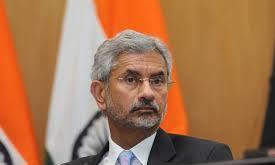
Use "national security filter": S Jaishankar to businesses on China dealings
text_fieldsIndia's External Affairs Minister S Jaishankar (file photo)
Indian businesses must apply a "national security filter" when engaging with China and prioritize sourcing from domestic manufacturers, External Affairs Minister S Jaishankar said on Friday, amidst the ongoing border tensions in eastern Ladakh.
During an interactive session at an event hosted by the Confederation of Indian Industry (CII), Jaishankar emphasized the importance of considering national security sensitivities in business dealings with China. However, he clarified that this does not mean completely prohibiting sourcing from the neighboring country.
"Where China is concerned, we will still encourage people in this country—manufacture in India, source in India, procure from India," Jaishankar stated, responding to a question. "We have not completely and utterly prohibited people working with China but frankly, we would much rather you work with Indian companies if there is an Indian option available to you. That I think is good for our national security, we hope you think that it is good for your own business in the long term," he added.
The external affairs minister highlighted the necessity of using a "national security filter" when conducting business with China. Addressing a specific query about the border dispute, he remarked, "Would you do business with somebody who has just barged into your drawing room and is trying to make a mess of your house fencing? You won't. There is a common sense proposition there."
In his address, Jaishankar also flagged concerns about the "weaponisation" of economic activity, referring to China's tactics. He expressed concerns over how access to raw materials or the stability of tourism are being used to exert political pressure.
"A different dimension of the concerns that we harbour is one emanating from a combination of excessive market shares, financial domination and technology tracking," he said. "Between them, they have actually allowed for the weaponisation of virtually any form of economic activity. We have seen how both exports and imports, access to raw materials or even stability of tourism has been utilised to exert political pressure," he added.
Jaishankar stressed that the current global landscape calls for more than business as usual. "Because trust and reliability have become so important, foreign policy is today charged with creating the comfort levels between governments to make that happen," he noted.
"This is especially so in terms of de-risking supply sources and enhancing collaboration in sensitive, critical, and emerging technologies," he added. "You can already see that unfold with the US in terms of the iCET dialogue that we had and with the EU in the Trade and Technology Council," Jaishankar said.
He emphasized the need for India's economic priorities to align with its strategic interests. "An economy with India's prospects also has to look at accessing global resources more seriously if we are to fuel our growth," he stated.
"For long, we have looked at Russia from a political or security perspective. As that country turns eastwards, fresh economic opportunities are presenting themselves," he added. "The spike in our trade and the new areas of cooperation should not be regarded as a temporary phenomenon," Jaishankar concluded.























